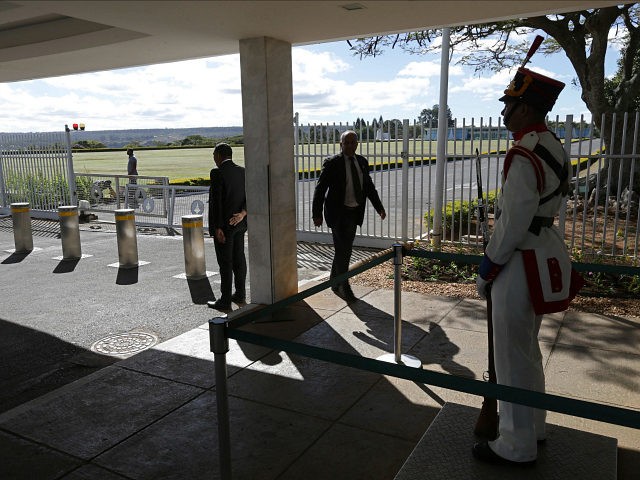An underaged person, whom reports describe as an “adolescent” boy, drove a car into one of the official residences of Brazil’s president Michel Temer Wednesday night in an apparent act of protest.
The incident occurred at the Alvorada Palace, a presidential palace that Temer has chosen not to live in but still uses for high-level meetings with government officials. While Temer and his family had lived at Alvorada in the past, they have since moved to Jaburu Palace. Temer was not at Alvorada at the time.
The Brazilian newspaper O Globo cites Brasilia police as stating that the attack occurred around 7 PM local time, calling it an attempt at “invasion.” “A minor knocked down a protective fence around the palace around 7 PM by abruptly accelerating the car,” the newspaper reported. “According to [the Institutional Security Agency for the Presidency], shots were fired at the vehicle but the driver was not injured.”
The car accelerated as a response to security at the premises telling the driver to slow down, which appears to suggest a deliberate action and not mechanical failure. The driver knocked down one of the gates protecting the palace and ran into the estate before finally being arrested in the master bedroom of the residence.
O Globo has since identified the boy, without naming him, as a 15-year-old and cited police as stating that he had stolen his parent’s car to drive it into the presidential palace. Other reports add that the boy spoke to police in “disjointed sentences,” is currently undergoing psychological counseling, and that the attack also consisted of the car driving around the estate’s garage and breaking windows.
Police have yet to state whether that have found any evidence that the minor’s attack on the presidential palace was politically motivated or whether they believe the individual has ties to any violent extremist or terrorist groups.
Car attacks have become increasingly prominent in the Middle East as radical Islamist groups encourage supporters to attempt to kill as many “infidels” as possible using “vehicular jihad.” Such attacks have also occurred with increasing frequency in Europe. Brazil does not have a significant Islamist presence, though the Islamic State did unsuccessfully attempt to prompt supporters in Brazil to attack the 2016 Rio de Janeiro Olympics through a Portuguese-language encrypted communications channel.
The Alvorada attack is the first such violent incident against a presidential palace in recent memory and arrives at a time of great strain for Temer and his administration. Temer became president following the impeachment of his predecessor, former Marxist guerrilla Dilma Rousseff. Even during Rousseff’s presidency, at the height of protests calling for her ouster, polls showed Brazilians would also choose to impeach and replace Temer.
This week, Brazilian prosecutors formally charged Temer with accepting over $100,000 in bribes from a meatpacking corporation through an intermediary, part of an expansive corruption probe tied to “Operation Car Wash,” a massive kickback scheme operated through the state-run oil corporation Petrobras.
Prosecutors allege that they have proof Temer received $152,000 from the meatpacking corporation JBS, months after investigators released an audiotape of a conversation between Temer and JBS chief Joesley Batista apparently discussing bribing former Brazilian Speaker of the House Eduardo Cunha, arrested for taking part in Operation Car Wash, into silence. Temer is the first Brazilian president to be charged with a crime while serving in office.

COMMENTS
Please let us know if you're having issues with commenting.